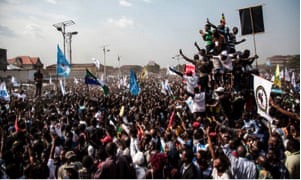|
Congo's election: a defeat for democracy, a disaster for the people

Written by: Mo Ibrahim and Alan Doss for the Guardian
Photograph: John Wessels/AFP/Getty Images
In accepting the controversial outcome of DRC’s presidential election, the global community has failed the country
The major players in the international community have accepted the outcome of January’s elections in the Democratic Republic of the Congo (DRC) in the name of stability. In doing so, they have failed the Congolese people.
Moreover, they have fallen short of the aspirations of the UN’s sustainable development goals, which call for “accountable and inclusive institutions”.
The results compiled by the independent national election commission (CENI), leaked to the press, confirm those of the Catholic church, which fielded 40,000 observers across the country. They show that Martin Fayulu, the opposition coalition candidate, won the presidential election, not by a whisker, but by a landslide.
However, after a week’s delay and intense negotiations, the CENI announced the victory of Felix Tshisekedi. This is a defeat for democracy.
Both in the region and beyond, many argue that, whatever its flaws, the election at least produced a transition from the long presidency of Joseph Kabila, which is the best bet to preserve stability in DRC and the wider Great Lakes region. They may well be wrong on both counts.
First, while Kabila has officially stepped down from office, he and his associates will most likely continue controlling the levers of power. His political coalition, having won an overwhelming (and improbable) majority of seats in the parliamentary elections, will ultimately determine the choice of prime minister, who will in turn manage the government’s key ministries and security agencies.
Second, though Tshisekedi’s election may have staved off major unrest in Kinshasa in the short-term, the new government will lack genuine legitimacy and risks repeated challenges to its authority.
Without that legitimacy, the government will find it hard to undertake the many serious reforms that DRC so urgently requires.
Kofi Annan often cautioned that legality does not necessarily confer legitimacy. Time and again we have seen leaders installed in office by legal manoeuvres that fail to confer the legitimacy required for effective leadership, especially in times of crisis. The international community should be mindful of that point as it considers how to respond to the post electoral crisis that has erupted in DRC.
Most worryingly, however, having seen that elections lack the power to change things, the Congolese people may turn to other methods to overturn the unbearable status quo, in which the vast majority of the population wallows in poverty while those at the summit of the state amass fortunes. Already there are calls to arms emerging from the east, which has a history of insurgency. There are dozens of armed groups active that could be harnessed to this cause. Many of the DRC's neighbours will be affected if another round of widespread violence erupts.
The international community has invested many billions of dollars in DRC over the past two decades to try to stabilise the country and the region, and to steer the republic towards a democratic, just and prosperous future. By passively accepting this fait accompli, all that investment will have been compromised.
That is why we call on the Southern African Development Community, the African Union, the EU and the UN, in particular, not to abandon the democratic aspirations of the Congolese people who voted overwhelmingly for change. It is not too late to insist on the publication of CENI's detailed results for both the presidential and parliamentary elections. In the meantime, they must maintain all existing sanctions and suspend any further extension of cooperation with the DRC government until a credible transition emerges.
Mo Ibrahim is founder and chair of the Mo Ibrahim Foundation. Alan Doss is president of the Kofi Annan Foundation
|
Mo Ibrahim & Alan Doss, 09/02/2019
|
|
|
|
The Mary Initiative
A Bridge of Understanding
Operational, Safety, Security & First Aid Training for NGO's
|
|
|
|